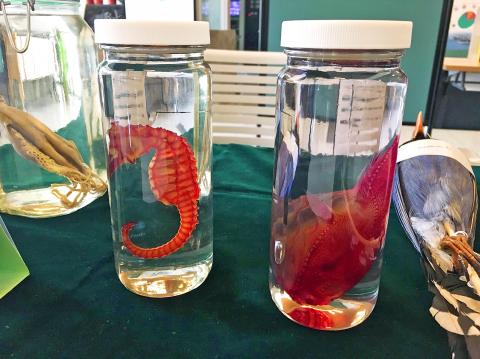Taiwanese researchers are contributing to a global initiative to identify, document and preserve the world’s species and biodiversity by developing cryobanking, DNA barcoding and online database programs, officials from the Forestry Bureau and the Academia Sinica’s Biodiversity Research Center told a news conference in Taipei on Thursday.
There are nearly 60,000 species in Taiwan, 8,000 of which are endemic, center research fellow Shao Kwang-tsao (邵廣昭) said.
To minimize the negative effects of biodiversity loss, the agencies have launched a liquid nitrogen cryopreservation program for wildlife genetic material, nicknamed the “frozen ark project,” they said.

Photo: Yang Mien-chieh, Taipei Times
Apart from permanently preserving biodiversity, the project could monitor changes in biodiversity and provide applications for the fields of biochemistry and biotechnology, which are expected to become highly competitive, they said.
The project might even be used to bring back extinct species, the agencies added.
The program is sponsored by the bureau and executed by the center, according to the program’s Web site.
Apart from preserving genetic material, researchers are also establishing a DNA barcoding program known as the “Taiwan Barcode of Life” that would make it easier to identify species, they said.
Preserving the genetic material of the nation’s native species is the first step toward contributing to the global DNA barcoding effort, the program’s Web site says.
DNA barcoding could be used when smuggled animal products no longer retain their original appearance, center postdoctoral researcher Huang Shih-pin (黃世彬) said, adding that the animal’s species and subspecies could be determined by “scanning” the DNA barcode.
The bureau and center have already collected 13,063 frozen wildlife specimens across 3,926 species for its cryobanking program and have processed the DNA “barcode” sequences of 3,796 samples across 1,983 species, they said.
They have also stored 1,058 dried fungal specimens across 1,177 fungal species and 1,166 strains of live fungi, and have processed the DNA barcode sequences of 1,687 fungal samples, they added.
The bureau and Academia Sinica in 2011 launched the Taiwan Encyclopedia of Life (TaiEOL) online database, modeled after the international Encyclopedia of Life (EOL) initiative, to document Taiwan’s endemic species.
The TaiEOL in September 2012 signed a memorandum of understanding with the EOL and became an official global partner.
The TaiEOL’s online database includes data on 21,642 species in Taiwan — about a third of the nation’s known species, they said, adding that the database is available for free on the program’s Web site.
The TaiEOL is also expected to launch a mobile app to give the public easier access.

US President Donald Trump said "it’s up to" Chinese President Xi Jinping (習近平) what China does on Taiwan, but that he would be "very unhappy" with a change in the "status quo," the New York Times said in an interview published yesterday. Xi "considers it to be a part of China, and that’s up to him what he’s going to be doing," Trump told the newspaper on Wednesday. "But I’ve expressed to him that I would be very unhappy if he did that, and I don’t think he’ll do that," he added. "I hope he doesn’t do that." Trump made the comments in

NOT AN OPENING: Trump’s violation of international law does not affect China’s consideration in attacking Taiwan; Beijing lacks capability, not precedent, an official said Taiwanese officials see the US’ capture of the president of Venezuela as a powerful deterrent to Beijing’s aggression and a timely reminder of the US’ ability to defeat militaries equipped with Chinese-made weapons. The strikes that toppled Venezuelan President Nicolas Maduro signaled to authoritarian leaders, including Chinese President Xi Jinping (習近平), US President Donald Trump’s willingness to use military might for international affairs core to US interests, one senior official in Taipei’s security circle said. That reassured Taiwan, the person said. Taipei has also dismissed the idea that Trump’s apparent violation of international law could embolden Beijing, said the official, who was not

A cold surge advisory was today issued for 18 cities and counties across Taiwan, with temperatures of below 10°C forecast during the day and into tonight, the Central Weather Administration (CWA) said. New Taipei City, Taipei, Taoyuan and Hsinchu, Miaoli and Yilan counties are expected to experience sustained temperatures of 10°C or lower, the CWA said. Temperatures are likely to temporarily drop below 10°C in most other areas, except Taitung, Pingtung, Penghu and Lienchiang (Matsu) counties, CWA data showed. The cold weather is being caused by a strong continental cold air mass, combined with radiative cooling, a process in which heat escapes from

Tourism in Kenting fell to a historic low for the second consecutive year last year, impacting hotels and other local businesses that rely on a steady stream of domestic tourists, the latest data showed. A total of 2.139 million tourists visited Kenting last year, down slightly from 2.14 million in 2024, the data showed. The number of tourists who visited the national park on the Hengchun Peninsula peaked in 2015 at 8.37 million people. That number has been below 2.2 million for two years, although there was a spike in October last year due to multiple long weekends. The occupancy rate for hotels